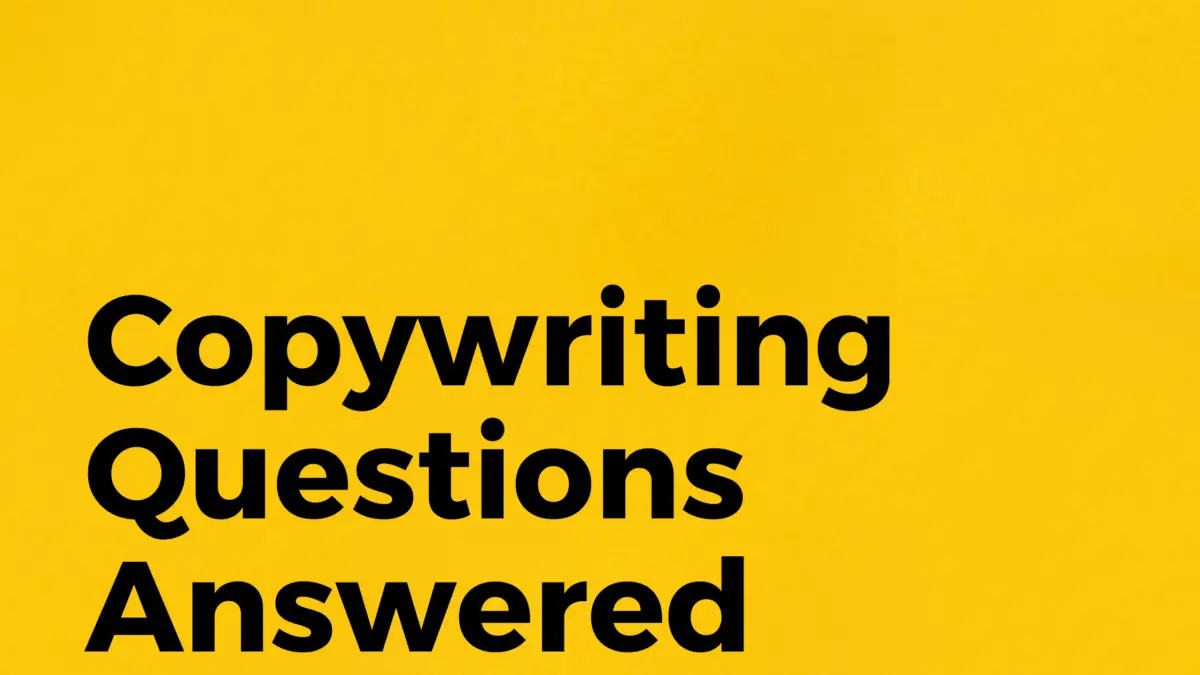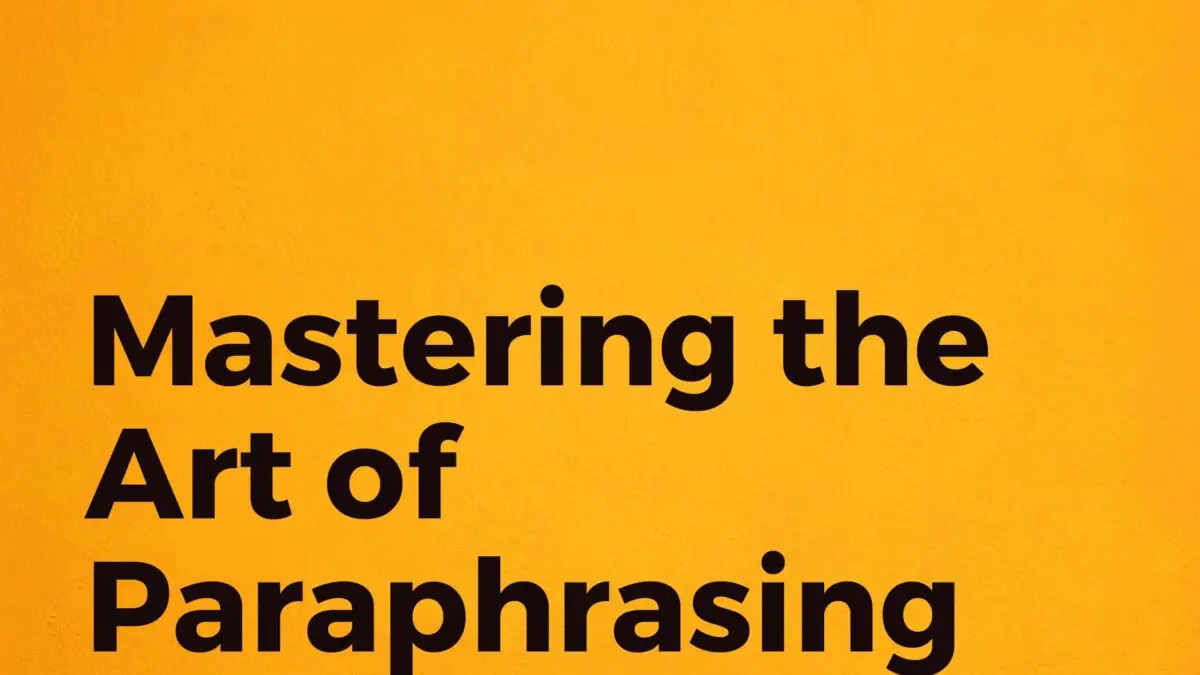Copywriting Questions Answered
What is the purpose of copywriting?
The main purpose of copywriting is to persuade people to take a desired action, such as buying a product or service. It’s essentially a form of marketing communication that uses words to create a persuasive argument. Copywriters are responsible for coming up with the headlines, body copy, and calls to action that appear on ads, website pages, landing pages, and other marketing materials.
How do you write copy?
To write effective copy, you need to understand your audience and what they want to know. That means taking the time to research your topic inside and out. Once you have a firm grasp on the subject, you can begin crafting engaging copy that speaks to your audience’s needs.
There are a few key elements that every good piece of copy should have: a hook, a call to action, and personality. The hook is what will draw readers in and make them want to keep reading. The call to action is what will prompt them to take action after reading your piece.
And finally, personality will ensure that your readers remember your work long after they’ve finished reading it.
Is copywriting the same as content writing?
There’s definitely some overlap between copywriting and content writing, but they are two distinct fields.
Copywriting is all about persuasion; it’s about crafting persuasive messages that will drive customers to take action. Content writing, on the other hand, is more about educating your audience and providing valuable information.
What are the types of copywriting?
There are several different types of copywriting that you can use to help your business:
SEO copywriting
This type of copywriting is all about optimizing your website and content for search engines. It’s designed to help you rank higher in search engine results pages (SERPs), thereby driving more traffic to your site.
Web copywriting
Web copywriting simply refers to any kind of writing that appears on a website. This includes everything from product descriptions to blog posts and podcast scripts.
Ad copywriting
As the name suggests, ad copywriting is all about crafting effective advertising and promotional materials. This could include anything from web banners and Facebook ads to print brochures.
Email copywriting
Email copywriting is the art and science of writing email content that gets people to take action.
Video copywriting
Video copywriting is the process of scripting and creating videos for marketing and advertising purposes. Copywriters typically use a mix of storytelling, persuasion, and call-to-action techniques to create videos that compel viewers to take the desired action, such as clicking a link or making a purchase.
What is Amazon copywriting?
Amazon copywriting is the process of crafting compelling, persuasive, and attention-grabbing text for use in Amazon product listings. The goal is to make potential buyers want to learn more about your product and ultimately make a purchase.
Crafting an effective Amazon listing requires a mix of strategic keyword research, appealing visuals, and of course, engaging copy. There’s no one-size-fits-all formula for success, but there are some general tips and best practices that can help you create a winning listing.
What is copywriting in SEO?
Copywriting is a vital part of effective SEO. A quality keyword-rich copy will help to improve your website’s ranking in search engine results pages (SERPs), as well as drive traffic to your site.
In order to make the most of your copy, it’s important to ensure that you are targeting the right keywords and using them in the right places.
Good copywriting can also help to improve click-through rates (CTRs) and conversion rates. For best results, ensure your copy is well-written, engaging, and relevant to your target audience.
What is video copywriting?
Video copywriting is the art of writing effective video scripts. Good video copywriting can help you sell your product or idea by getting your viewer to take action.
There are a few basic things to keep in mind when writing a video script:
- Write for the viewer. Make sure your words are easy to understand and that your message is clear.
- Keep it brief. Most people won’t watch a long video, so keep your script short and to the point.
- Use strong verbs. Your words should evoke an emotional response, so use strong verbs that create a visual image in the mind of the viewer.
- Be persuasive. The goal of a video script is to persuade the viewer
What are the four P’s in copywriting?
The four P’s of copywriting are:
- Promise – What’s in it for the reader?
- Proof – How do you know it works?
- Passion – Why should they care?
- Persuasion – How do you get them to take action?
What skills should a copywriter have?
When it comes to skills that a copywriter should have, there are a few key things that come to mind. First and foremost, a copywriter needs to be a strong wordsmith. They need to have the ability to write catchy, compelling copy that engages the reader and drives conversions.
Additionally, a good copywriter needs to be well-versed in SEO best practices. This way, they can ensure that their copy is not only effective but also visible to potential customers.
Lastly, it’s always helpful if a copywriter has some experience in design or layout. This way, they can create visually appealing content that catches the eye and ultimately drives results.
What is the PAS formula in copywriting?
The PAS formula is one of the basic tools of copywriting. It stands for Problem-Agitate-Solve. Basically, you start with the main problem (or claim), then you explain your approach or strategy for addressing that problem (agitate over it), and finally provide a solution with evidence or examples.
You can use the PAS formula to structure an entire essay or just individual paragraphs. It’s a helpful way to make sure you’re covering all the important elements of your argument and keeping your writing focused and on-point.
What are the 6 core copywriting skills?
The six core copywriting skills are:
1) Understanding the consumer/reader
2) Identifying the consumer’s need or want
3) Developing a message that speaks to the consumer’s need or want
4) Crafting headlines and leads that capture the reader’s attention
5) Organizing and presenting information in an easily readable format
6) Editing and proofreading your work for accuracy and clarity.
How long will it take to learn copywriting?
It depends on how much you practice and how committed you are to learning. Generally, it takes around six months to a year to become proficient in copywriting. However, some people may take longer or shorter depending on their level of natural talent and how much effort they put in.
The most important thing is to keep practising and learning as much as you can about the art of copywriting. There’s always something new to learn!
Can anyone be a copywriter?
Yes, anyone can be a copywriter. It just takes some practice and skill development.
Copywriting is all about persuasion. And persuasion is a skill that can be learned by anyone. The key is to study the craft and then apply what you learn in a consistent and strategic way.
So, if you’re interested in becoming a copywriter, start by reading up on the basics of copywriting, practising your skills, and then putting yourself out there as much as possible. You’ll get better over time and eventually, you’ll be able to write persuasive copy that sells.
How can I practice copywriting?
If you want to practice copywriting, there are a few things you can do. First, find some samples of good copy and analyze why they work well. Try to reverse-engineer the strategies the writer used to craft an effective piece.
Then, find some opportunities to write copy yourself. This could be anything from writing a persuasive email to crafting a landing page for a website. Pay attention to how your words make people feel and whether or not they take action after reading your words.
The more practice you get, the better you’ll become at copywriting.
Do you need a qualification to be a copywriter?
No, you don’t need a formal qualification to be a copywriter. However, studying English, communications or marketing at university will give you a solid foundation upon which to build your career.
That said, many copywriters come from diverse backgrounds – not just English majors. As long as you have excellent written communication skills and are able to think creatively, you can definitely succeed in this field.
Of course, it helps to be familiar with the basics of advertising and marketing as well. If you’re not sure where to start, there are plenty of introductory books and online resources that can help get you up to speed.
Is being a copywriter a good career?
There’s no one-size-fits-all answer to this question, as the best career for you will ultimately depend on your specific skill set and interests. However, if you’re passionate about writing and have a knack for conveying complex information in an engaging and accessible way, then a career in copywriting could be a great fit for you with great pay!
How much does a copywriter charge per hour?
This is a tough question to answer because there are so many variables involved. The hourly rate can depend on the copywriter’s experience, the project’s scope and complexity, and even the client’s budget.
That said, most copywriters will fall somewhere in the range of $50-$200 per hour.
So, if you’re looking to hire a copywriter for a project, be prepared to spend anywhere from a few hundred dollars to several thousand.
What is a copywriter’s salary?
As far as full-time salaried positions go, most entry-level copywriters make around $40,000-$50,000 per year. Mid-level copywriters can earn $60,000-$80,000 per year, and Senior-level or Executive copywriters can bring in $100,000 or more annually.
Is copywriting in demand?
Yes, copywriting is in high demand. In a world of online content, good copy is essential for drawing attention to and engaging with readers. Copywriters are responsible for creating compelling, persuasive, and interesting content for websites, articles, blog posts, and social media.
Copywriting is a necessary skill for any business that wants to connect with its customers online. And because good copywriting can be the difference between a website that’s successful and one that’s not, businesses are always on the lookout for talented copywriters.
So, if you have a knack for writing and you’re interested in freelance writing or marketing, then copywriting is definitely a field worth exploring.
How do copywriters get clients?
It’s actually pretty easy for copywriters to get clients, as long as they have a strong portfolio and can demonstrate their skills.
Copywriters can get clients in a few different ways. They can cold call potential clients, network with other professionals, or post ads online. They can also work with a marketing agency that provides services to businesses.
No matter how they get their clients, copywriters always need to be sure to deliver high-quality work that meets their client’s needs. This means doing extensive research, drafting persuasive proposals, and staying up to date with the latest trends in writing.
How do I find my niche in copywriting?
Copywriting is all about finding your voice and understanding your audience. It’s also about being clear, concise, and persuasive. To find your niche in copywriting, you’ll need to do some research and determine what type of writing appeals to you most.
Once you’ve found your niche, it’s important to stay up-to-date on the latest trends in your industry so that you can continue delivering fresh, original content that engages your readers. Continual learning and practice are essential ingredients for any successful copywriter. So, get out there and start writing!
Who is the best copywriter ever?
There’s no one definitive answer to this question, as “best” is a pretty subjective term. But there are definitely some well-known and respected copywriters out there who could be considered among the best and David Ogilvy is one such. He’s often been referred to as “the father of modern advertising.”


